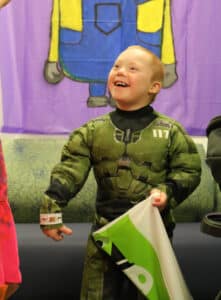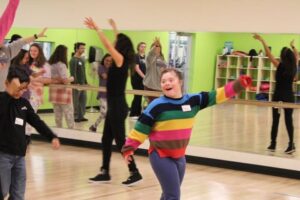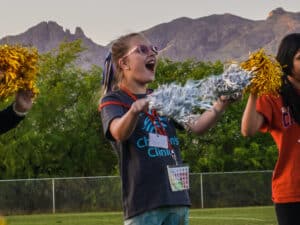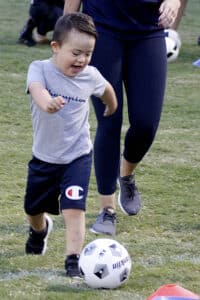Ralph Griffin, a spunky seven-year-old boy, runs around Children’s Clinics with ease and confidence after his speech therapy appointment. “He has grown up here. It’s like a second home,” his mother, Amanda Griffin, explains regarding his comfort level. “He’s not afraid here. He feels welcomed and safe, even on the days with blood draws.”
Ralph has been coming to Children’s Clinics as a patient since he was discharged from the NICU to see a cardiologist for his heart. At the time, Amanda and Ralph were seeing the same cardiologist at Children’s Clinics. Amanda has a heart condition that brought her to Children’s Clinics as a child, and when she became pregnant with Ralph, her condition needed monitoring.
“It was really comforting to see the same cardiologist. It made life so much easier at the time,” Amanda shares. “And everyone here feels like an extension of family. Everyone knows him. He’s not just another face. I’ve never had a bad experience at Children’s Clinics. The entire staff, from scheduling to even the janitors, they’ve never treated him like he wasn’t a kid. They’ve always treated him like he was a human.”
Ralph grabs Amanda’s hand and escorts her over to the craft table. He motions for her to begin coloring on a Paw Patrol sheet while he begins coloring on a Spiderman one. Amanda naturally reflects on his actions pointing out that he’s a sharer and wants everyone to feel included. He is also a very social and outgoing child and particularly loves little kids.
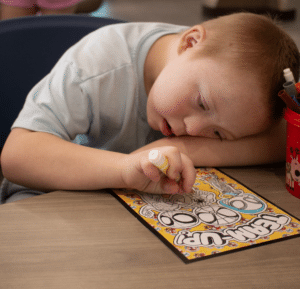
Despite Ralph’s multiple healthcare needs, he is in every way a typical boy. He’s an active and physical child, with P.E. and Motor Lab being his favorite activities at school. He loves Spiderman, The Incredibles, puzzles, Legos, and the video game Kingdom Hearts.
His communication skills have improved recently after receiving his new talker device (speech tablet) from Children’s Clinics in April. These devices typically help children express a wider range of words, thoughts, and emotions than with speech and gestures alone. Amanda confirms that the tablet has helped Ralph with demonstration and assists him with putting together full thoughts. She’s seen his confidence grow as a result of it.
Amanda dives into how speech therapy hasn’t been the only help she’s received from Children’s Clinics. She is very grateful for the assistance she received during the first few months of Ralph’s life. Being a new mother is challenging, but being a new mother of a child with special medical needs, she was completely unprepared. The most impactful memory she recalls is of Ralph’s feeding therapy.
“He didn’t understand hunger. He didn’t show any hunger cues. He refused to eat in any kind of way. If it wasn’t for the feeding therapy and primary care here, helping me keep up with the G-tube feedings and the education I received, I wouldn’t have known what to do. Even the physical and speech therapy, on my own, he never would be where he is without those teams.”
It is this multi-disciplinary model of care at Children’s Clinics that has facilitated support to not only Amanda and Ralph but to the over 5,000 children in Southern Arizona and their families. The focus is not only on healing and helping children but assisting the whole family in their care.
“One thing I am thankful for is all the therapists were here for him of course – the goal is to get him to learn, but they do a very good job of educating me on the things I can do at home. They always make sure I have the tools at home and that is so helpful.”
Ralph’s attention is pulled away by another boy in the lobby and he’s off to go play. As Amanda leaves her coloring sheet to go watch him she mentions, “I learned early on that I am not alone in his care. They see his care as important. That’s never changed.”